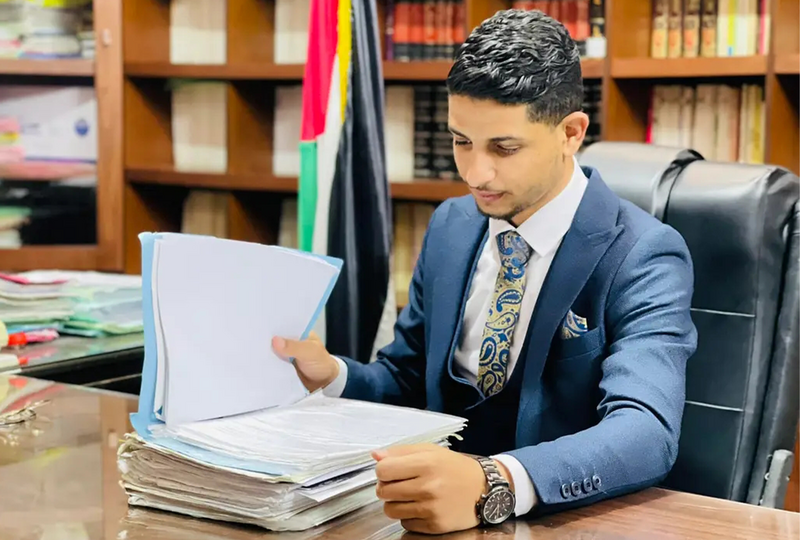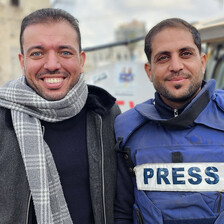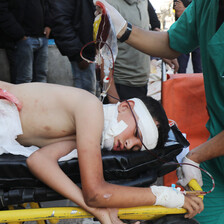The Electronic Intifada 8 November 2024

Mohammed Refat Jarghoun, 24, was killed by Israel in September 2024. He was a recent law school graduate.
A few days before his own martyrdom, my friend Mohammed Refat Jarghoun told me that he wanted to write a book with the names and biographies of all the martyrs of the genocide on Gaza.
I told him this was a great idea, but that it might be impossible. The number of martyrs – over 43,000 as of November 2024 – is too huge, and only growing. There would be no way to write them all down.
Mohammed Refat was 24 years old and a law school graduate when Israel killed him and many members of his family in September 2024.
His last social media post, on 27 September 2024, read: “Now our fate is written in blood, but the traces of the spirit clinging to freedom have not been erased.”
I felt sad when I read these words and tried to reach out to him, but I was unable to reach him.
Soon after, I read his name on a list of martyrs, along with his brother Hashem, his sister Nada, and his mother and father, posted to Telegram at the end of September. I was shocked. I read the list several times to confirm that it was really him.
We went to the Nasser Hospital morgue to see him one last time. We carried him and his family members on our shoulders as we took them to the cemetery for burial. It was important that we were all there so they knew they were not alone.
I am here to record Mohammed’s name on the list of martyrs – to write his entry in that imaginary book that he himself wanted to write one day. It is not an easy thing to do. Some stories are too difficult to record.
Legal aid for the displaced
I met Mohammed in high school, but our friendship really grew when we studied law together at Al-Azhar University.

Mohammed with his mother at graduation.
Mohammed studied public law and graduated in 2022, with distinction. He was passionate about his work and about using law to improve the lives of others. I looked to him as a model of steadfastness and strong will.
Mohammed’s family was displaced to al-Mawasi, on the Khan Younis side, in May 2024. They had been displaced by Israeli attacks on the Sheikh Nasser neighborhood of Khan Younis.
Life in a tent was a struggle; its burdens endless. But Mohammed opened up a law office in his tent, complete with a sign and a desk inside, and sought to help people continue in the business of daily life.
He had an official seal, so he could certify marriage and property contracts. He would also advise people on various matters, since no courts are operating under this genocide. Some media outlets even came to interview him about his work.
Outside of this legal work, he was determined to find ways to get clean drinking water to the camp more reliably. In the days before his martyrdom this was his focus. He would contact humanitarian organizations and people of means to enlist their help in providing drinking water to all.
Now that he is gone, I have made clean drinking water my focus.
I was proud to have a friend like him in my life. It is very painful to talk about this loss.
Our guide
Mohammed did not allow circumstances to hinder him. On the contrary, he used these circumstances to be creative and to show initiative. He earned the trust and respect of those around him by exhibiting these qualities.
At the end of September, Mohammed went with his family to pick olives from their land in al-Manara in southern Khan Younis, which was designated a “safe” area by the occupation.
It was their last moments in life. Israel fired missiles at them and killed them. The media outlets that had reported on him as a source of hope for people living in tents now reported that he had been martyred.
But I promise you, my friend, the traces of your spirit will not be erased from this world. Although your departure left us sad and empty, you are in a better place.
I am committed to your values and to the things that you believed in. As long as the people in Gaza have life left, we will continue to tell your story for future generations.
In writing this, I am keeping some of your story private, so I can have something of you all to myself. I wish that you had achieved your dream of going on to study international law. You badly wanted to end this conflict, to help Palestinians.
Here in Gaza, this small spot that is dear to our souls, there are still more young people like you, with unwavering determination and faith in our cause. I hope they will look to you as their guide.
Hassan Ahmad Abu Sitta is a writer and law student in Gaza.




